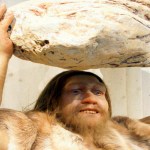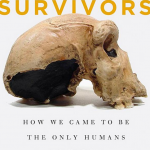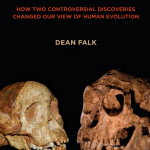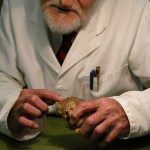Human Evolution
The evidence from palaeoanthropology suggests that in the past humans were about the stature they are now, with more sexual dimporphism than now, with similar or larger brains than they have now, and used technology at the same level of sophistication as many later humans. Scientists argue over the degree to which modern day language abilities, symbolic thinking, and artistic capacity was found in these earlier humans.
Where we see physical evidence suggesting morbidity or even mortality among those humans, which included "archaic Homo sapiens" and Neanderthals and their kin, we often see…
Chris Stringer's new book, Lone Survivors: How We Came to Be the Only Humans on Earth, attempts to reconcile the age-old conflict between the "Multiregional" and "Out of Africa" hypotheses of Modern Human origins. Stringer has long been identified with the "Out of Africa" hypothesis, and his criticism of the Multiregional model pretty much still hold. In the Multiregional model, different groups of a human ancestor, i.e., Homo erectus (and friends) existed over a large region of the earth (Africa and Eurasia) and different populations of that ancestral populations evolved in parallel to…
The Fossil Chronicles: How Two Controversial Discoveries Changed Our View of Human Evolution is by a scientist Dean Falk, who has contributed significantly to the study of evolution of the human brain, and who has been directly involved in some of the more interesting controversies in human evolution.
Back when I was a graduate student I was assigned by my advisor a set of literature to absorb and comment on. The mix of published and soon to be published papers included a series of papers written by Ralph Holloway and Dean Falk. These represented a fight over the interpretation of early…
Born in Africa: The Quest for the Origins of Human Life by Martin Meredith examines the history of human evolution studies, focusing on Africa, and provides a comprehensive overview of the conflict between different researchers, different points of view, and sometimes, different evidence. It is a good read.
Meredith starts out with an examination of the Taung fossil, its discoverer, anatomy, and associated controversy. As you probably know, Taung was brought light by anatomist Raymond Dart, and had its initial impact on human evolutionary studies in the 1920s when the British Piltdown…
Lewis Black has a formula for addressing creationists. You carry around a fossil. Then, when someone starts talking about creationism, you pull it out and hold it up in plain view and say "Fossil!" Then, if they keep arguing, you throw it over their head. That makes me laugh.
Despite the fact that I am a raging secularist and activist atheist, not all of my friends are. And, I have a friend for whom I have nothing but love and respect who happens to be a fundamentalist evangelical Christian. Personally, I'm sure that down inside she is also an atheist, and I know she knows I think that…
The term "Dunbar's Number" refers to a particular hypothesis by primatologist Robin Dunbar. It is a very simple idea with rather complex implications, and it is one of those simple ideas that gets more complicated than ideal as we look into it more and more. Eventually, the idea is required by many who contemplate it to do more work than was ever intended, and in this way seems to fail, though it really doesn't. I personally think Dunbar's number is useful if it is properly understood, so I want you to give it a chance, and to help you do that I'd like to use an analogy.
I'm thinking of a…
Philip Tobias passed away this morning, according to a mutual friend. I've not heard any details.
Tobias is the most important hominid anatomist to have lived in the 20th and early 21st century, having taken the chair originally established by Raymond Dart at Wits University. He literally defined several of the hominids, being the anatomist to author the official diagnosis of several species. He was also a human rights champion, an excellent poet and decent singer and performer, an excellent teacher, a great friend, a strong and central personality in human evolution and unbelievably demure…
We had a great discussion with John Hawks on the radio today. The podcast of that conversation is available via any one of the routes indicated here.
We discussed australopiths, Homo, Paleolithic sex, ancient DNA and fossil casting calls. And more. Check it out.
Thanks, John, for your time!
John Hawks is one of the nation's leading palaeoanthropologists, and has lately been working with ancient DNA, recent and earlier Human Evolution, and an interesting project that is a sort of casting call for extinct humans and their relatives.
Most of you know John from his famous Internet site called "John Hawks Weblog: Paleoanthropology, Genetics and Evolution." John is an associate professor of Anthropology at the University of Wisconsin, Madison, which is one of the better known and respected for this sort of research.
Unless you've been living in a cave, you know that there are many…
Recently, I mentioned two new books on human evolution, and I told you I had a print review of them coming up.
Well, it's here, in American Scientist!
Yes, I know, that's an internet thing, but it is the internet version of the print thing. Please have a look, and leave a nice comment! Or a mean comment, whatever.
The Fossil Chronicles: How Two Controversial Discoveries Changed Our View of Human Evolution and Born in Africa: The Quest for the Origins of Human Life are two very recent books on human evolution, both of which I recommend, depending on your interests.
The first is by Dean Falk, who has studied brain endocasts for the last 30 years. Falk chronicles her early work on endocasts, the relationship between that work and the much earlier work of Raymond Dart, in South Africa on the first Australopith fossil, and touches on the problems of being a woman with somewhat controversial findings to…
If you read only one book this holiday season, make it all of the following twenty or so!
But seriously ... I'd like to do something today that I've been meaning to do, quite literally, for years. I want to run down a selection of readings that would provide any inquisitive person with a solid grounding in Behavioral Biological theory. At the very outset you need to know that this is not about Evolutionary Psychology. Evolutionary Psychology is something different. I'll explain some other time what the differences are. For now, we are only speaking of fairly traditional Darwinian…
Check out this video my friend Lynn made:
More here, including lots of text. Teachers, you could probably find a use for this in your classroom.
Why is it so hard to understand a commonplace thing like orgasms?
I think I know why science does not understand the female orgasm. It is because science excels when it breaks free of context, history, human complexities and anthropology, but when a topic requires one to grasp context, history, human complexities and anthropology, then science, especially the hard sciences, can fall short. Also, the nature of the female orgasm is a comparative question, but human sexuality is highly (but not entirely) derived; It is difficult to make a sensible graph or table comparing aspects of sexuality…
Two things have been known for some time now: Human brains get bigger as you go north, and the volume of the primate eye and the primate brain are correlated.
This COULD mean, and this may not be true, that as you go north in human populations you'll get larger brains (for thermoregulatory reasons) and you'll therefore get larger eyes (because eyeball and brain size is somehow correlated). But a new paper suggests a different model: Large eyes evolve at high latitudes because there is more dark, and the larger eye demands a larger brain.
Maybe, but I doubt it. the largeness of high latitude…
Behaviors are not caused by genes. There is not a gene that causes you to be good, or to be bad, or to be smart, or good at accounting, or to like bananas. There are, however, drives. "Drives" is a nicely vague term that we can all understand the meaning of. Thirst and hunger are drives we can all relate to. In fact, these drives are so basic, consistent and powerful that almost everyone has them, we share almost exact experiences in relation to them, and they can drive (as drives are wont to do) us to do extreme things when they are not met for long periods of time. While eating…
Richard Tokumei has written a book that is so bad he is ashamed to put his own name on it. "Richard Tokumei" is the pen name of a 'writer/editor in Southern California [with] degrees in Humanities and Phychology from the University of California Berkeley" and he has produced a book designed to anger everyone who hears of it in order to create needless sensation and thus, sell copies. Which, once people get their hands on, will make rather low quality toilet paper.
Monkeys On Our Backs: Why Conservatives and Liberals Are Both Wrong About Evolution includes an inexplicable mix of "correct"…
This post has moved HERE. To the stone age blog!
Human infants require more care than they should, if we form our expectations based on closely related species (apes, and more generally, Old World simian primates). It has been said that humans are born three months early. This is not accurate. It was thought that our body size predicted a 12 month gestation, and some suggested that Neanderthals would have had such, but this research conclusion has been set aside based on new analysis. But it is still true that developmentally, human children do not reach a stage of development that allows some degree of self care for a very long time…
It is possible that a much earlier than previously known date for the use of flaked stone tools has been established in Ethiopia, dating to prior to 3.39 million years ago.
A paper just out in Nature by McPherron et al suggests that a set of marks found on two bones recovered from the surface very near a locality for which an estimated date can be obtained were caused in antiquity by stone tools wielded by hominids. The date predates any prior known chipped stone tool artifacts of the kind that would leave such marks. The absence of chipped stone tools in the archaeological record in which…




